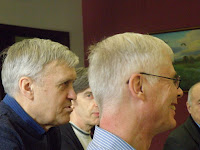 |
| Looking at Rublyov's Trinity. Tretyakov Gallery, Moscow, 2016. |
Psalm 122:1. I was glad when they said unto me, Let us go into the house of the Lord.
Habakkuk 2:20. But the Lord is in his [sic; KJV] holy temple: let all the earth keep silence before him.
Katharine Evans and Sarah Chevers. We said, we had thousands at our meetings, but none (of us) dare speak a word, but as they are eternally moved of the Lord; and we had Miracles, the Blind receive their sight, the Deaf do hear, and the Dumb do speak, the Poor do receive the Gospel, the Lame do walk, and the Dead are raised.
Last week I tried to make a case for the classic Quaker discipline of silence as a setting to experience the freedom and trust offered by (and required by) worship centered on God.
This week I just want to add a related aspect. I mentioned the noisy world we all live in now, whatever our theological and devotional preferences might be. The scandal I'm pointing to now is how much of that noise is God-talk.
True, some of that God-talk is simply earnest attempts to persuade the audience of one or another form of Good News, with wildly varying degrees of effectiveness.
But so much of it is just plain argumentative. And many of those arguments verge on, or cross the line of, false witness.
- Did Oprah Winfrey really mock Jesus?
- Did Barack Obama really offend "every believing Christian in the United States"?
- Is everyone who holds more or less traditional religious beliefs a plodding idiot?
- What is the difference between a genuinely radical message (Jesus: "Repent and believe the good news") and out-and-out pandering to a congenial market?
- Are we being honest about our audience, or are we actually making noise to seek the approval of our home base?
(You can see that I've generated my own share of this noise!)
Maybe we're under the illusion that if we don't keep up this barrage of argumentation, the forces of heresy will win. The bigger danger is this: those who claim to speak for God (including those I approve of!) will continue to lose credibility.
Amos 8:11. Behold, the days come, saith the Lord God, that I will send a famine in the land, not a famine of bread, nor a thirst for water, but of hearing the words of the Lord....
Are some of us experiencing this paradoxical famine? If so, let's do something about it.
Let's risk going into God's presence, and gently invite (without clever arguments) anyone who'd like our company there, and gather there, praying quietly for the famine to end. Let's experience freedom and joy in the quiet. Let's trust that the Holy Spirit knows what to do. In the meantime, let's at least consider keeping our mouths shut.
See also: Reverence.
And Yakov Krotov's lessons on courteous communication for Christians: See this post, and scroll down to "Kind questions."
"Can you show me how to pray?" Greg Morgan's reply.
The Guardian reviews Russell Moore's Losing Our Religion.
“We see now young evangelicals walking away from evangelism not because they do not believe what the church teaches, but because they believe the 'church itself' does not believe what the church teaches,” Moore laments.
Tom McCall and the doctrine of good works, interviewed by Beth Felker Jones.
 |
| Yuri Sipko (left); Russian Evangelical Alliance annual meeting, 2016. |
Video: Barbie goes to Russia. (Tuesday afternoon, with street temperature of 107 degrees F. here in Portland, Oregon, Judy and I enjoyed watching it in a local air-conditioned theater.)
... *sigh* I see in these links, I've not entirely avoided God-talk!
Ireland's Imelda May, "When It's My Time."
No comments:
Post a Comment